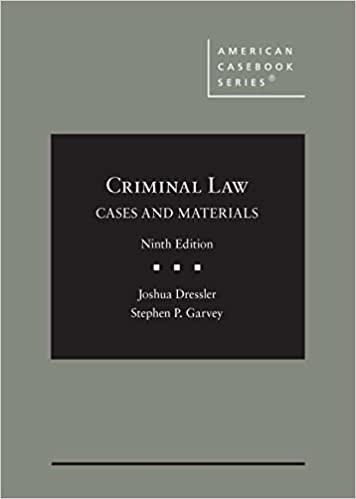Question
Pat, a resident of State X, was involved in an automobile accident in State Y withDan. Pat sued Dan in State X Municipal Court alleging
Pat, a resident of State X, was involved in an automobile accident in State Y withDan. Pat sued Dan in State X Municipal Court alleging personal injury damagesof $200,000. Dan was served with process in State Y in the manner authorizedby the State X "long arm statute" which provides that the courts of State X "mayexercise jurisdiction on any basis not inconsistent with the Constitution of theUnited States." Although he is a resident of State Y, Dan spends approximately sixweekends a year in State X at a small vacation cabin in which he has a one-eighthownership interest.
Dan moved for dismissal on the ground that Municipal Court lacked personaljurisdiction over him. The motion was denied. Dan filed an answer asserting thatPat's negligence caused the accident, and the case proceeded to trial. The juryreturned a verdict in favor of Pat in the amount of $100,000. Both State X and State Yhave rules making contributory negligence a complete defense in a negligence suit.
Dan appealed on the grounds that: (1) Municipal Court lacked personal jurisdictionover Dan, and (2) Municipal Court lacked jurisdiction to hear controversiesexceeding $10,000. Although the jurisdictional limit for Municipal Court was$10,000, the appellate court ruled that Dan had waived his right to contest bothpersonal jurisdiction over him in Municipal Court and Municipal Court's subjectmatter jurisdiction to hear the case. The appellate court affirmed the judgment andit became final.
Subsequently, Bob, a bystander who had been slightly injured in the collision,filed a complaint in State X Municipal Court against Dan and Pat for damages of$10,000, alleging negligence. Pat answered and filed a cross-complaint against Danfor damages to Pat's car arising from the collision.
Based upon the above facts, the following motions were made: Bob moved forsummary judgment against Dan on the issue of negligence; Pat moved for summaryjudgment against Dan on the issue of negligence and for summary judgmentagainst Bob; Dan moved for a summary judgment against Pat.
1. Should Bob's motion for summary judgment against Dan be granted? Discuss.
2. Should Pat's motion for summary judgment against Dan be granted? Discuss.
3. Should Pat's motion for summary judgment against Bob be granted? Discuss.
4. Should Dan's motion for summary judgment against Pat be granted? Discuss.
Step by Step Solution
There are 3 Steps involved in it
Step: 1

Get Instant Access to Expert-Tailored Solutions
See step-by-step solutions with expert insights and AI powered tools for academic success
Step: 2

Step: 3

Ace Your Homework with AI
Get the answers you need in no time with our AI-driven, step-by-step assistance
Get Started


